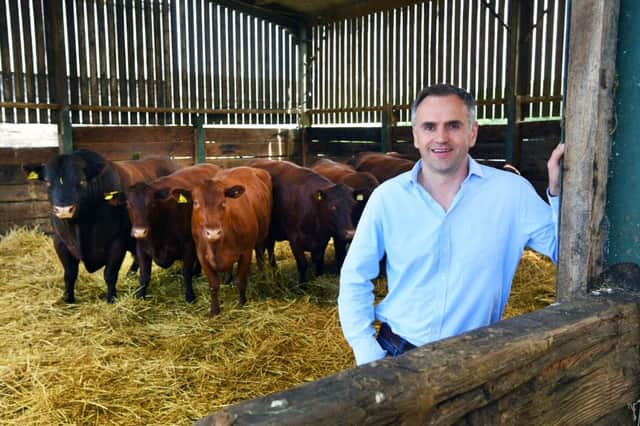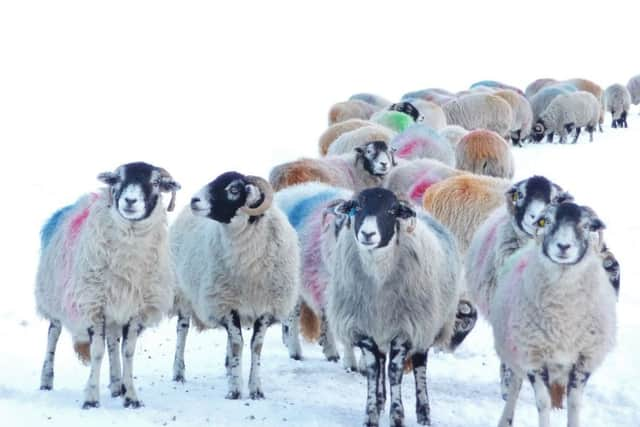Food for thought for Yorkshire farmers as climate change fears see consumers cut out meat


If you were buying ingredients for a sausage casserole for dinner, would you automatically head for the meat counter? Tesco is hoping you might not. Recently it has been advertising vegan products on television. An advert for “Carl’s all change casserole” features a stressed father being told by his daughter “Daddy, I don’t want to eat animals anymore”, so he switches to meat-free sausages instead.
The National Farmers’ Union did not like it, complaining that the advert “demonised meat as a food group”. And yet the Carls of this world appear to be expanding, with or without prompting from the next generation. A survey for another supermarket in 2018 found that 12.5 per cent of Britons now class themselves vegetarian or vegan with a further 21 per cent flexitarian – those opting for meat occasionally.
Advertisement
Hide AdAdvertisement
Hide AdIt reflects a food trend that has been simmering away for some time. Beef consumption fell by 24 per cent in the UK from 1990 to 2017, while lamb and mutton fell by 72 per cent. Meanwhile, sales at the Quorn group, maker of plant-based ‘meat’, have continued to grow.


Traditionally those avoiding meat have done so for reasons of animal welfare or healthy eating, but now there is concern for the environment too. The Committee on Climate Change, the government’s advisory body, says agriculture accounts for around 10 per cent of UK greenhouse gas emissions. Livestock account for most of that, about eight per cent. And here is a body blow for those keen on the environment who also enjoy a steak or some lamb chops: ruminants like cattle and sheep are directly responsible for up to 60 per cent of agriculture’s emissions, mainly through, putting it politely, burping and passing wind.
It’s the result of the fermentation in their gut that allows them to digest the grass that we cannot but that also produces methane and nitrous oxide. The latter is known as laughing gas but there is nothing funny here. Both are highly potent greenhouse gases.
Scientists say significant changes to land use in the UK are needed if agriculture is to play its part in achieving zero greenhouse gas emissions by 2050, which they insist is essential if we are to help global efforts to avoid dangerous climate change. That target has already been accepted by government.
Advertisement
Hide AdAdvertisement
Hide AdThe suggestion is we should reduce grassland used to rear and fatten livestock by one-third and increase the amount of forestry, hedgerow and bioenergy crops, while restoring upland peatlands and diversifying a fifth of our arable land into crops such as sunflowers, grain maize and soya.
However, farming traditions go back centuries and are deeply ingrained in rural culture. Dr Tara Garnett is the co-ordinator of the Food Climate Research Network, based at Oxford University. “There are no easy answers to this,” she says. “We have to decide what sort of configuration of food production and wildlife we want in the UK and how we achieve that in a globalised economy. It has both environmental and social consequences.
“The basic thing we have to do to eat more sustainably is cut down on animal and dairy products. Just considering cattle and sheep, they don’t just contribute to greenhouse gas emissions, they use up a lot of land and are also very inefficient users of nutrients.”
One obvious question if we are to rely less on meat is can we grow alternative protein crops such as lentils, beans and peanuts here in the UK, where they are not normally seen as compatible with our climate? “We’ve spent a lot of time over many years researching the genetics of really productive breeds of farm animal but very little time on research and development into growing pulses here. With effort, it may be perfectly possible.”
Advertisement
Hide AdAdvertisement
Hide AdDr Garnett adds, however, there is no need to become self-sufficient in all food items, which could even cause more harm than good. There is always a trade-off between local production at any cost and transporting items from far away where they can be grown much more easily. “If you really tried, you could grow bananas in the UK but why would you want to? It would take a huge amount of energy in hot-houses and there is plenty of good, free sunshine overseas. If bananas can be transported efficiently, then why not?”
Moving to more vegetarian-based diets might make sense on paper. Against that, many of us look forward to our Sunday roast. Not least, any talk of moving away from meat and dairy-based diets is likely to receive a frosty reception from livestock farmers since it is hardly good news for them, a twist on the old adage that turkeys would never vote for Christmas.
Farmers are often suspicious of vegetarians and vegans. Andrew Loftus farms near Ripon and has a suckler herd of 50 cattle. “There are people who eat too much meat,” he says, “but this idea of us having to switch to vegetarian diets comes with ethical motives dressed up in green clothing.”
And James Copeland, Environment and Land-Use Advisor for the NFU in Yorkshire, reminds us that things are more complicated than we might like. “Our livestock farming is two and half times more efficient than the global average. If we reduce production of meat here, consumers might switch to a source from somewhere else that’s less carbon-efficient.”
Advertisement
Hide AdAdvertisement
Hide AdClearly that would defeat the object and he also points out that, through drought and flood, climate change has this year caused problems for fruit and vegetable production in this country. “If we did move to a plant-based food sector in the UK, would we in fact make ourselves more at risk from climate impacts?” And he raises the question, so pertinent in Yorkshire, of what to do with marginal land in the uplands other than use it to produce sheep or cattle?
“The environment doesn’t allow us to grow carrots productively in the Yorkshire Dales,” he says, an obvious but sometimes overlooked point. “Not only that, but our existing farmed landscapes in places such as the Dales are the basis of a fantastic and renowned tourist industry.”
That is true – would we still find the Yorkshire countryside attractive and interesting without its trade-mark four-legged residents? One idea that has been mooted as an alternative future for our uplands is simply letting nature take over. Dubbed rewilding, it attracts supporters.
Loftus though is not so sure. “Rewilding can be romantically appealing but shouldn’t be mixed up with climate change action. If we really wanted to combat climate change, that would point to intensive timber plantations rather than rewilding.”
Advertisement
Hide AdAdvertisement
Hide AdCopeland responds to calls from some that farmers should simply do the right thing and switch to plant-based systems. “It is not for farmers to tell people what to eat,” he says.
That puts consumers, all of us, partly in the driving seat but are enough of us looking at the big picture?
Calls for public to reduce meat consumption
For health reasons, Public Health England’s Eatwell Guide promotes diets with a large reduction in beef and lamb consumption, a smaller reduction in dairy products, replacement of meat protein with pulses and an increase in fruit and vegetables.
Currently grassland and rough grazing make up 48 per cent of the UK land area. Arable land makes up 26 per cent and forestry and woodland 13 per cent.
Advertisement
Hide AdAdvertisement
Hide AdThe UK population is currently predicted to rise by nine million by 2050 – when the UK is targeting zero greenhouse gas emissions.
If we carry on farming and eating as we are doing, agriculture is likely to be one of the largest emitters of greenhouse gases by 2050.